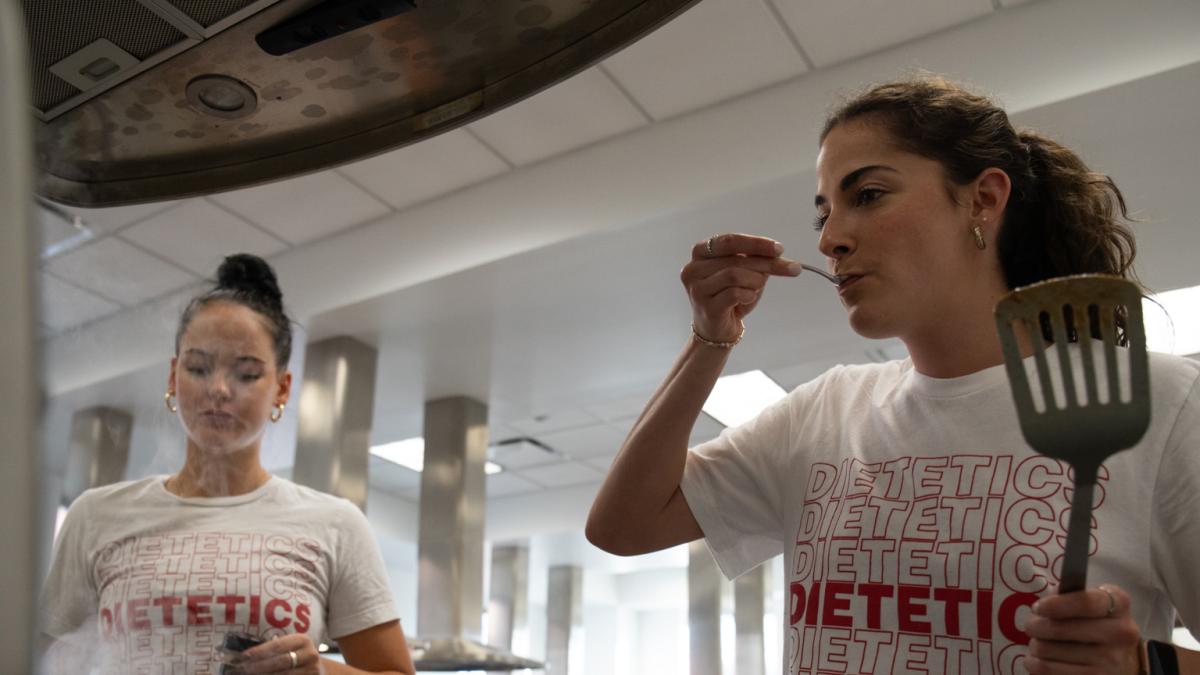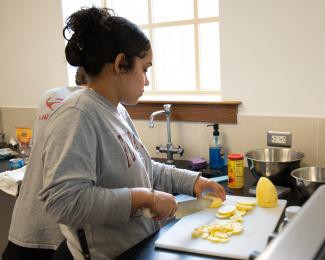Dietetics

Dietetics is one of four undergraduate majors in the Department of Health, Nutrition, and Food Sciences. Dietetics students have an opportunity to learn from nationally recognized exercise physiologists, food scientists, dietitians and nutrition experts. The undergraduate didactic program in dietetics (DPD) provides a foundation for developing knowledge and competencies in the core areas of dietetics practice (i.e., clinical dietetics, community nutrition, and food service/systems management). The program offers students a unique introduction to sports nutrition. Students may choose electives to further their knowledge in their area of interest.
The dietetics program is a specialized access program. After admission to the University, students must apply to the major. The program accepts up to 40 students each fall.
Courses are offered in person on the main campus in Tallahassee. Students enjoy smaller, more intimate classes and form strong connections with classmates. Core dietetics courses have approximately 35 students and consist of group projects, presentations, case studies and practicum experiences.
Students majoring in dietetics may earn a DPD (Didactic Program in Dietetics) Verification Statement (which is required to apply for a dietetic internship and sit for the registered dietitian exam).
Accreditation
The DPD program is fully accredited by the Accreditation Council for Education in Nutrition and Dietetics:
120 South Riverside Plaza, Suite 2190, Chicago IL, 60606-6995
800/877-1600 ext 5400

Registered Dietitian Nutritionists (RDNs) are food and nutrition experts who have completed a minimum of a graduate degree from an accredited dietetics program. To become an RDN, individuals must complete a supervised practice, pass a national exam, and engage in ongoing professional development. RDNs work in diverse settings, including healthcare, private practice, community health, sports nutrition, corporate wellness, food and nutrition businesses, universities, and research. They educate patients, provide medical nutrition therapy, manage foodservice operations, and offer services to a wide array of individuals and organizations. There are also specialty credentials in areas of gerontological nutrition (CSG), sports dietetics (CSSD), pediatric nutrition (CSP), renal nutrition (CSR) and oncology nutrition (CSO).

All coursework is offered in person on the main campus.
Dietetics is a specialized admission major. Students apply for formal admission and upper-division certification to this program during sophomore year. Freshman, first-time in college students, are admitted as NFA-Dietetics (Not Formally Admitted).
1. Admission to The Florida State University Apply to FSU
2. Completion of academic mapping milestones through term 4
3. An overall undergraduate GPA of 2.75
4. Successful completion of HUN 1201 (Science of Nutrition)
5. Receive a grade of “Satisfactory (S)” in DIE 3005 (Introduction to Dietetics)
6. Submit a personal statement
DIE 3005 is offered in the spring and summer terms. Transfer students will have the opportunity to complete this course in the summer at FSU before admission decisions are made. Detailed information about the application process will be provided in this course.
Students with exceptional circumstances who have not met the minimum 2.75 overall undergraduate GPA, or completed Organic Chemistry may enter an appeal to be considered for admission.
A verification statement documents that an individual has completed the requirements of a nutrition and dietetics education program accredited by the Accreditation Council for Education in Nutrition and Dietetics.
Learn more about ACEND verification statements.
Students at FSU may earn a DPD verification statement which establishes eligibility to apply to a Dietetic Internship or Individualized Supervised Practice Program. Upon completion of your supervised practice program you will receive another statement from your internship director.
Requirements to earn a verification statement:
If you find you are off track for earning a verification statement, please see your program director.
Receiving your verification statement:
A few weeks before your graduation date you will be asked to fill out a survey in the canvas site. You must fill out this survey so we know where to send your verification statement.
Once degrees confer (this is usually a few weeks after the end of the term), the program director will review transcripts, complete verification statements and email them to you with a certified digital signature. These are good forever. Please keep them in a safe place. You will need to provide one to your internship director and possibly for licensure for the state in which you will be practicing.

An ACEND accredited internship is required to sit for the RD exam. Internships provide approximately 1000 hours of hands-on practical experience in the field including rotations in: clinical, food service management, and community nutrition. Rotations and length of each experience depends on the internship.
The FSU Dietetic Internship is available to students who have earned a DPD verification statement and are enrolled in the M.S. in Exercise Physiology (sports nutrition major) or M.S. in Nutrition and Food Science (clinical nutrition major). Specializations are available in either sports nutrition or clinical nutrition, depending on their respective degree.

You can apply to any program for which you have met the pre-requisites. Every program has a different set of pre-requisites. Check websites and research potential programs to find each program’s prerequisites. If you select a graduate program in nutrition, you probably have met all of the prerequisite coursework. However, if you choose a graduate program outside of nutrition, you may need to complete additional courses. It is beneficial to do this before you graduate with your bachelor’s degree.
All graduate programs have different titles; there is no standard name for “nutrition programs”. In general, you have probably completed the prerequisites for programs including “nutrition” or “dietetics” in the title. You will also have met the prerequisites for graduate programs that offer a dietetic internship.
The majority of M.S. programs take two years to complete. Ph.D. programs can take several years, depending on the program and your area of research.
Note: Dietitians becoming credentialed in 2024 or after must have a graduate degree.
Please review the following to understand the requirements for the dietetics bachelor's program.